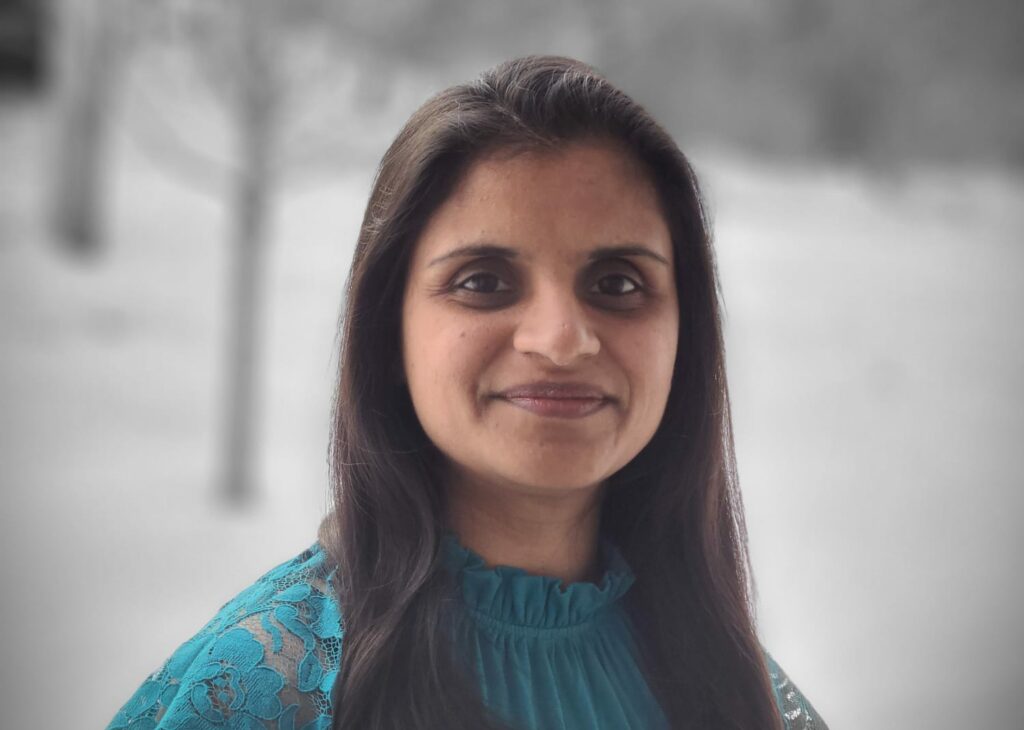We’re taking time to get to know the members of the GSA’s Early Career Scientist Committees. Join us to learn more about our 2021 early career scientist advocates.

Madhumala K. Sadanandappa
Co-Chair, Career Development Subcommittee
Member, Steering Committee
Postdoc at Geisel School of Medicine at Dartmouth
Research Interest
“Nothing in neurobiology makes sense except in the light of behavior,” a quote from Gordon Shepherd (1988), inspires my research career. While I am fascinated by the diverse array of interesting, strange, and innumerable behaviors displayed by organisms, my study aims to discover new, conserved biological underpinnings of these behaviors.
Of fundamental interest, my graduate thesis addressed the question of how behavioral habituation occurs in terms of the neural circuits, synapses, and molecules involved. Behavioral habituation refers to the ability to ignore familiar and insignificant stimuli seamlessly. Although it is a fundamental characteristic of animal cognition, the underlying mechanisms remained unclear. Our work on olfactory habituation in Drosophila directly led to a general and revised model for how habituation works in various sensory circuits across species, for which there is now new emerging support from mammalian neurophysiology.
My postdoctoral research, which is funded by a fellowship from the Human Frontiers Science Program, aims to understand behavioral and physiological modifications in fruit flies in response to parasitoid wasps. In nature, a parasitoid wasp infection is the leading cause of mortality in fruit flies. After the wasp infection, if the larvae fail to suppress the development of a wasp egg, then the wasp egg develops, hatches, molts, and grows as an adult wasp and emerges from a fruit fly pupal case. Interestingly, Drosophila adults that were never infected by a parasitoid wasp recognize the threat and modify their behavior, reducing the infection risk in the progeny. By combining behavioral assay with neurogenetics and physiological studies, our recent study showed the role of neuroendocrine signaling in innate recognition of predator threat in fruit flies, thereby unraveling the mechanisms that underlie an ecologically relevant form of behavior (Sadanandappa et al., 2021). We are currently interested in understanding whether the observed behavioral and physiological modifications are a generic response of fruit flies to wasps or if this is specific to parasitoids.
As a PhD-trained scientist, you have many career options. What career paths interest you the most?
My research career is driven by curiosity. I look forward to every day, thrilled to ask the same question repeatedly because I enjoy the process of chasing the unknown—hypothesis, experimentation, data acquisition, revalidations, etc. In addition, working with an excellent team who were passionate about science, such as my advisors, collaborators, and colleagues, made a lot of difference and contributed to my academic success.
In the future, I am interested in developing a career in scientific editorial or scientific administration where I can contribute toward advancing the scientific enterprise and also enjoy my passion for science. I also look forward to engaging myself in various science outreach activities.
In addition to your research, how else do you want to advance the scientific enterprise?
Science and society are two sides of the same coin. In the last decade, we have made rapid development in scientific research and technology; unfortunately, our community is far behind in catching up to that speed. For instance, during the COVID pandemic, we witnessed a massive gap between science and society. Shockingly, we are battling with infodemics rather than the risk of infection and preventive technologies. As researchers, it is our responsibility to engage with society to disseminate and communicate science effectively. Beyond the benchwork, I immerse myself in various volunteering community activities that create scientific awareness among the public. For instance, through the Freedom Employability Academy (FEA) mentorship program, a non-profit educational organization in India, I interact with young adults from disadvantaged backgrounds and help them craft their career paths. In addition, I utilize the same platform to create awareness about advancements in the scientific field and encourage students to pursue a career in science.
Next, the scientific enterprise itself—how can we make it a better place for current and upcoming researchers? Using the various scientific platforms, I communicate issues specifically related to graduate students and postdocs, such as creating inclusive workplaces, challenges of researchers with a disability, normalizing parenthood in academia, and sharing various resources available to researchers.
As a leader in the Genetics Society of America, what do you hope to accomplish?
As a Co-Chair of the Career Development Subcommittee, I set short- and long-term goals. The immediate short-term goals are to support the ongoing projects of our subcommittee such as the Decoding Life Series, #WorkshopWednesdays, and Career Exploration Panels at the GSA conferences, to encourage my fellow committee members to achieve their career goals, organize the events and develop resources that help navigate the career paths of graduate students and postdocs, and initiate a collaborative project between different ECLP subcommittees. In addition to a new sense of purpose and satisfaction in supporting my peers, these leadership roles personally help me develop soft skills and expand my professional networks.
My long-term goals mainly focus on diversity, accessibility, and inclusion. Therefore, I am excited to be a part of the Accessibility and Disability Advocacy, a new initiative by career development subcommittee member Oindrila De and other GSA early-career leadership program members. We aim to promote awareness, help destigmatize disability, advocate for accessibility, and build barrier-free initiatives that increase the visibility of researchers with disabilities in ongoing ECLP and GSA programs.
Additionally, being a parent-scientist and an international researcher, I am aware of the challenges which directly impact the scientific productivity, career growth, and mental health of early career researchers. I am currently serving on the GSA Conference Childcare Committee, which has been tasked with better accommodating parent-researchers at the GSA conferences. When we switch back to in-person meetings, I hope to see the implementation of several measures proposed by the committee—dependent care grants, lactation rooms, on-site childcare facilities, etc. Likewise, I hope to initiate a support system for early-career parent-scientists and parents-to-be in the GSA leadership program.
Lastly, my graduate experience was improved by my participation in professional societies. Having benefited from the training programs offered by the GSA and other organizations, I strongly recommend graduate students and postdocs to engage with the professional societies actively. Furthermore, I want to use the opportunity afforded by the GSA Early Career Leadership Program to utilize my experiences to support and involve international researchers in ECLP programs., so we can expand our horizons.
Previous Leadership Experience
- 2021 ASAPbio Fellow
- Member, GSA Conference Childcare Committee
- Early Career Reviewer, GENETICS
- Mentor, Freedom Employability Academy (FEA), India
Connect with Madhumala Sadanandappa on Twitter and LinkedIn.













